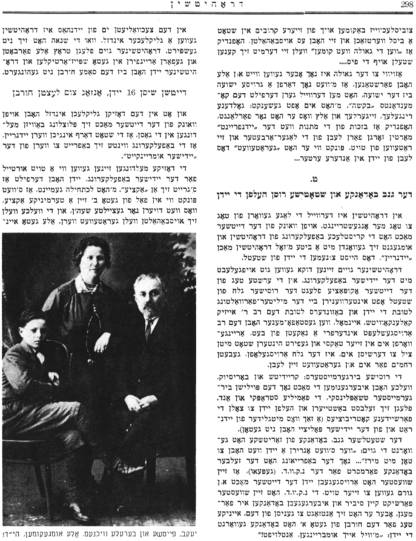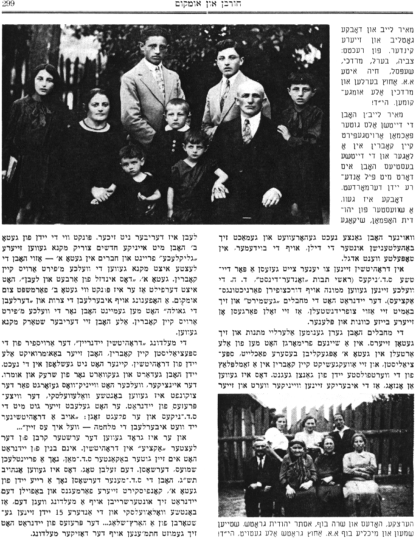
[Page 298]
relatives in town that they hid away, hoping that upon liberation they could use it to get themselves on their feet.
Since the “redemption” was still far away, and everyone realized that they would need another redemption to get to that redemption, they were happy to fill the commander's “requests.” They frequently gave him gifts of gold rings, watches and anything else the owned, hoping that because of this the “friend of the Jews” Martin would protect the lives of the camp workers just like he had supposedly done for Jews elsewhere.
9.
The thief Bodanka and local Russian gentiles help the Jews
In the meantime the situation in Drohitchin worsened by the day. At the wink of the German authorities, the Christian population of Drohitchin and nearby communities made a request to have Drohitchin made Judenrein [free of Jews] by expelling the Jews from town.
Non-Jews in Drohitchin got along well with the Jewish community. In the first days of the German occupation the Russian priest in town frequently intervened with the military administration on behalf of the Jews, and especially on behalf of Rabbi Isaac Kalenkovich. Once, when the Gestapo dragged the rabbi out of bed and threw him in their taxi to drive him out of town where they were going to shoot him, the priest ran out to appeal for the rabbi, thereby saving his life.
The Russian mayors Kreiditch and Borisiuk who took over after the Polish mayor Chaplinski, the Strapki family and others, would provide financial assistance (which many of the members of the Judenrat and the Jewish police wouldn't do) to help the Jews pay various contributions.
The local thief, Bodanka of Zaritchka, warned the gentiles: “Whoever touches a Jew will have to face me!” After the liberation Bondanka told the Soviet NKVD that his sister handed Jews over to the Germans, thereby causing their deaths. The NKVD sent his sister to Siberia and gave Bodanka her property, though he refused to take it. A few days before the destruction of Ghetto A, Bodanka warned the Jews that death was imminent and they should flee.
In the wave of hatred toward Jews, Drohitchin was a happy little island where hatred didn't spread. Despite all the prohibitions, gentiles in Drohitchin would bring food products into the ghetto, and no Jews went hungry until the final Destruction.
Germans shoot 16 Jews: an omen of the final Destruction
At the behest of the German authorities announcements suddenly appeared on the streets of this same island of happiness stating that the town was to soon become empty of Jews, and that the population looked forward to becoming liberated of “Jewish filth.”
These announcements were like a death sentence for the Jewish community. Jews felt that an aktsia was going to take place. People thought it would be the same as what happened in Ghetto B, and that it would be limited, lasting for just a few hours, with those in hiding being saved. The entire community spent entire nights toiling away to
[photo:] Yaakov, Feitsha and Berele Vichnis. All perished. May G-d avenge their blood!

[Page 299]
build hideouts under floors, in attics and behind double walls. There were a few Germans in Drohitchin who were responsible for the extermination aktsias, and the Judenrat paid them off enough to stop them from carrying out their vicious intentions.
The terrorists liked receiving all types of gifts but did their work. One early morning they gathered together all the best workers and specialists from the workshops in Ghetto A, and sent them off to Kobrin to be together with the “worthy” Jews of the entire area.
This portended that those remaining behind were worth less, and therefore their lives were insecure. Just like the Jews from Ghetto B only a few months earlier had been jealous of their “lucky” friends in Ghetto A, those remaining behind were envious of those who were taken to Kobrin. Ghetto A – the island of work and life – now felt that just like Ghetto B it was now sentenced to death. The hope of surviving the troubled period and live to see the Redemption was now only with those who were taken to Kobrin. That's why everyone else was so envious.
The announcement of “Jew-free Drohitchin,” and the transfer of the specialists to Kobrin worried all the Jews of Kobrin, and no one slept at night. They just melted from fear and worry. The only ones who had less to worry about for their future were Bontsha Volovelsky, the vice-chairman of the Judenrat. He got along very well with the Germans involved in the aktsias, and used to say, “If any Drohitchin Jew survives the war, it will be me.”
It turned out that he was the first victim of the final aktsia in Drohitchin. In the Judenrat building a German who knew him well shot him after a friendly discussion. On the same day, which was after Rosh Hashanah in 1942, the Germans shot another group of people in Ghetto A, confiscated their possessions and ordered the Judenrat to sign an announcement about the fact that Bontsha Volovelsky and fifteen other Jews died from heart failure. The chairman of the Judenrat had to sign that announcement.
[photo:] Meir Leib and Dobka Gottlieb and their children. From right: Zvia, Berel, Mordechai, Shepsel, Chaya-Ita and others. They all perished except for Berel. May G-d avenge their blood!
Meir Leib was considered a good professional and taken to Kobrin by the Germans. He was in a camp, and the German beasts murdered him there with many other Jews. Dobka was a sister of Yehudit Hoffman of Chicago.
[photo:] Hertzka, Hoddes and Sarah Buff; Esther Yehudit Gratch. Standing are: Shimon and Michele Buff and another. All died except for Gratch. May G-d avenge their blood!
Previous Page |
Next Page
JewishGen, Inc. makes no representations regarding the accuracy of
the translation. The reader may wish to refer to the original material
for verification.
JewishGen is not responsible for inaccuracies or omissions in the original work and cannot rewrite or edit the text to correct inaccuracies and/or omissions.
Our mission is to produce a translation of the original work and we cannot verify the accuracy of statements or alter facts cited.
 Drogichin, Belarus
Drogichin, Belarus
 Yizkor Book Project
Yizkor Book Project
 JewishGen Home Page
JewishGen Home Page
Copyright © 1999-2024 by JewishGen, Inc.
Updated 19 Dec 2001 by LA